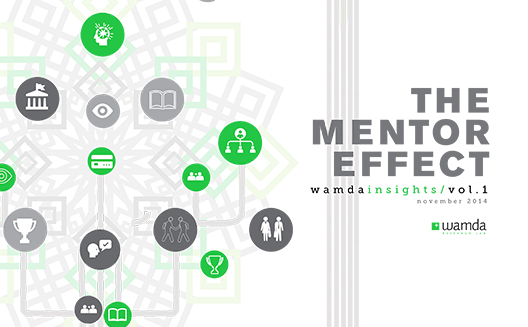The Mentor Effect, Wamda Insights Vol. 1


Through Wamda Insights, a new quarterly publication from the Wamda Research Lab, we aim to share new knowledge and data on the Middle East and North Africa (MENA) ecosystem. Over the past several years Wamda has celebrated, mentored, and studied thousands of entrepreneurs across the MENA region. Each Insights publication coalesces information collected from each of our different programs and initiatives, packaged around a core theme.
One pillar of a healthy entrepreneurship ecosystem is access to knowledge. A high quantity of quality information flowing through an ecosystem can help shape policy decisions, create new programs to support entrepreneurs, and identify opportunities for new entities to become more active. To enable and accelerate any ecosystem’s development, a culture of knowledge sharing must be at its core.
In this first volume of Insights - The Mentor Effect - our research team has pooled information from across Wamda to focus on the role mentors can play in supporting entrepreneurs and why the MENA region needs more of them. Our research, media, and community experience suggests that the more access entrepreneurs have to mentors, the greater their access is to important resources. This makes mentors a critical element to any entrepreneurship ecosystem.
What the data tells us
In a Wamda Research Lab study of over 700 entrepreneurs in the MENA region, conducted in partnership with Endeavor Insight, a higher percentage of mentored entrepreneurs received support from family and friends than non-mentored entrepreneurs. Similarly, higher percentages of mentored entrepreneurs received access to angel investment, venture capital firms, and incubators than non-mentored entrepreneurs.
Table – Tweetable insights from Insights Vol. 1
#WamdaResearch finds entrepreneurs with mentors have more access to strategic resources than non-mentored ones. Tweet this
In #WamdaResearch report, 72% of mentored companies received investment vs 44% of non-mentored companies. Tweet this
Nearly 50% of surveyed entrepreneurs did not have a mentor according to In #WamdaResearch Lab’s Insights. Tweet this
34% of mentored entrepreneurs have access to angel investment vs. 12% of non-mentored finds #WamdaResearch study. Tweet this
50% of mentored companies had one round of funding vs. 30% of non-mentored companies finds #WamdaResearch. Tweet this
In #WamdaResearch Lab’s Insights, 20% of mentored companies had more than one round of funding vs. 15% of non-mentored. Tweet this
#WamdaResearch Lab’s newest publication offers cross-cutting insights on best practices for mentorship in MENA. Tweet this
#WamdaResearch new study says community engagement w/ mentors & entrepreneurs enhance conditions for startups in MENA. Tweet this
However, the WRL also found that many of the entrepreneurs that it studied did not actually have mentors. Nearly half – 40% of surveyed entrepreneurs – did not have a mentor. Despite the connection between having a mentor and accessing important resources in the ecosystem, many entrepreneurs lacked mentorship support. Filling this gap is critical both for entrepreneurs as well as the ecosystem itself. Identifying the venues and strategies for doing so must be a high priority.
Disseminating knowledge to the ecosystem
Celebrating the stories and lessons from mentorship relationships is one method for enhancing mentorship practices in MENA. A key element of Wamda Media’s engagement with the region’s ecosystem is collecting insights from experts. Interviews with leading investors, executives, and entrepreneurs themselves can help in spreading insights that can be used across countries and industries.
In discussions with expert mentors, the Wamda Media team has collected a series of important insights. The below list captures some of the most important takeaways from these interviews, which includes mentors’ main recommendations on hiring and building teams:
- Always be on the lookout for potential hires and build a talent pipeline.
- Recruit a team with complementary skills and surround yourself with people with diverse skills.
- Teach at universities to develop relationships with potential hires at an early stage.
- Set up training systems from the beginning for both retaining employees and also sustaining and scaling the company.
- Incentivize talent to join and remain with the company.
Publishing these insights and spreading them across the ecosystem is a top priority. Open access to information from mentors can help not just in boosting awareness of how mentors are helping entrepreneurs, but also of the necessity of having good mentorship practices in an ecosystem.
Bring the community together
The ecosystem must actively take steps to fill the mentorship gap. Research and media can help to disseminate information on the value and need for more mentors, but without bringing together a community of entrepreneurs and mentors, the value of these insights will be diminished.
Since 2012, Wamda Community has conducted 15 Mix N’ Mentor events across eight countries in the MENA, bringing together over 2,000 entrepreneurs and 300 mentors from inside and outside the region.
There are several key ingredients to successfully implementing these events:
Structured meet-ups: The events are structured around key themes and entrepreneurs are paired with mentors in a carefully selected manner.
Building a network of mentors: Wamda community team consistently searches for new mentors to add to its network. Serial entrepreneurs, investors, lawyers, seasoned professionals, and experts with deep experience in certain areas can all contribute to forming this community.
Capture insights to build
on: Spreading knowledge on the dynamics of these exchanges
and sharing the advice
from mentors is critical. Packaging and disseminating these
insights plays an important role in creating a culture of
mentorship, and also helps to improve the quality of future
engagements between mentors and entrepreneurs.
The below visual depicts the main concepts underpinning healthy and productive exchanges between entrepreneurs and mentors. While each mentor-entrepreneur pair is different, these are crosscutting insights that can be applicable to entrepreneurs and mentors around the MENA region.
We hope you enjoy reading this first volume of Wamda Insights and look forward to sharing more knowledge from our network in the coming months.





